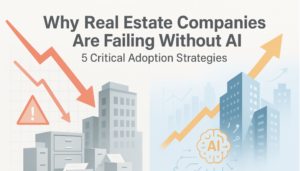
Property management is a multifaceted sector within the massive real estate industry. At its core, it consists of overseeing and managing property—be it residential, commercial, or industrial—on behalf of an owner. But to truly appreciate its complexity and high potential, one must dive deeper into the property management business model. This model, when properly understood and applied effectively, can transform an ordinary property management firm into a very thriving enterprise.
Innovations Transforming Property Management
As we move into the digital age, technological innovations are continually reshaping industries, and property management is no different. The property management business model is experiencing a technological metamorphosis. With the introduction of smart home technologies, property managers can now offer added value to tenants through innovations like intelligent security systems, energy-efficient solutions, and smart home integrations, enhancing the overall living experience. In addition to this the rise of data analytics equips property managers with insights to make informed decisions, forecast market trends, and better understand tenant behaviors and preferences. Adopting and utilizing these innovations not only amplifies the value proposition for property owners and tenants but also positions a property management firm at the forefront of the industry that is ready to harness the opportunities the future presents.
The Anatomy of the Property Management Business Model
The property management business model can be understood as an ecosystem where various elements work together to create value both for property owners and the management firm. Here’s a breakdown:
Income Sources: Unlike real estate sales, where revenue comes primarily from selling properties, the property management business model is based on recurring income. This often includes monthly management fees (usually a percentage of the rental income), leasing fees for new tenant placements, and additional fees for services like property maintenance or tenant screening.
Value Proposition: The primary value proposition is reducing the burden on property owners. From marketing properties and sourcing tenants to handling day-to-day maintenance requests and ensuring legal compliance, a property management firm offers complete expertise and convenience.
Operational Efficiency: Key to the property management business model’s success is operational efficiency. Streamlined workflows, adept use of property management software, and a well-trained team can significantly reduce operational costs, directly benefiting the bottom line.
Scalability: Another hallmark of this business model is its scalability. As the portfolio of managed properties grows, the firm can leverage economies of scale, allowing for expansion without a linear increase in overheads.
Pillars of a Successful Property Management Business Model
To develop a thriving property management enterprise, understanding foundational pillars of the property management business model is important:
Relationship Management: At its core, property management is a relationship-centric business. Building and maintaining trust with property owners and tenants is crucial. Effective communication, transparency in operations, and timely response to concerns can foster long-lasting relationships, ensuring a steady flow of income.
Diversification: While residential properties might be the mainstay for many, diversifying into managing commercial spaces, vacation rentals, or even industrial properties can offer multiple revenue streams. It not only hedges against market volatility in one segment but also provides avenues for growth.
Leveraging Technology: The modern property management business model is increasingly intertwined with technology. From using advanced property management software for efficient operations to employing digital marketing techniques for property promotions, technology is a game-changer.
Continual Learning and Adaptability: The real estate and rental landscape is ever-evolving. Be it changes in rental laws, evolving tenant expectations, or market dynamics, a successful property management firm stays informed and readily adapts.
Navigating the Nuances of Property Management: A Deeper Dive
As we move deeper into the property management business model, it’s imperative to explore the nuanced aspects that contribute to its sustainability and profitability. The property management sphere is not merely about managing properties; it’s about navigating through a myriad of challenges and opportunities that the real estate market presents, ensuring a harmonious balance between tenant satisfaction and profitability.
The Significance of Tenant Experience in Property Management
Tenant experience is paramount in the property management business model. A satisfied tenant is likely to be a long-term tenant, thereby ensuring a consistent revenue stream. Enhancing tenant experience involves:
Personalized Services: Tailoring services according to the unique needs and preferences of tenants, such as customized leasing terms or personalized property modifications.
Community Building: Fostering a sense of community among tenants through events, gatherings, and interactive platforms, which can enhance tenant retention and create a positive living environment.
Responsive Management: Ensuring that tenant queries, complaints, and maintenance requests are addressed promptly and effectively.
Strategic Marketing in Property Management
Effective marketing strategies are pivotal in minimizing vacancies and attracting the right tenants. The property management business model should incorporate:
Digital Presence: Leveraging online platforms, social media, and property listing sites to maximize visibility among potential tenants.
Targeted Marketing: Identifying and targeting specific tenant demographics through tailored marketing campaigns and promotional activities.
Brand Building: Establishing a strong brand presence that resonates with values like reliability, transparency, and quality to attract and retain tenants and property owners alike.
Financial Management: The Backbone of Sustainability
Robust financial management is crucial to navigate through the economic ebbs and flows of the property management business. This involves:
Budget Management: Implementing meticulous budgeting to manage operational costs, maintenance expenses, and other financial obligations.
Investment Strategies: Identifying and capitalizing on investment opportunities, such as acquiring new properties or upgrading existing ones to enhance value.
Risk Mitigation: Employing strategies to mitigate financial risks, such as maintaining a contingency fund for unexpected expenses and ensuring comprehensive insurance coverage.
Legal Compliance and Ethical Management
Adhering to legal norms and maintaining ethical standards is non-negotiable in property management. This encompasses:
Regulatory Adherence: Keeping abreast of and complying with local, state, and federal regulations pertaining to property management and tenant rights.
Ethical Practices: Upholding ethical standards in dealings with tenants, property owners, and vendors, thereby enhancing reputation and credibility.
Dispute Resolution: Implementing effective dispute resolution mechanisms to amicably resolve conflicts and maintain healthy relationships with stakeholders.
Sustainability and Environmental Responsibility
Incorporating sustainability and environmental responsibility into the property management business model is not only ethically sound but also increasingly demanded by modern tenants and property owners. This involves:
Green Initiatives: Implementing eco-friendly practices, such as energy-efficient lighting, waste management systems, and green spaces, to enhance property appeal and minimize environmental impact.
Sustainable Development: Considering sustainability in property development and management, ensuring that properties are not only compliant with environmental regulations but also contribute positively to the community and environment.
Challenges and Solutions in the Property Management Business Model
Like any business model, property management comes with its set of challenges. Vacancies, unexpected maintenance costs, disputes, and regulatory changes can impact profitability. However, the property management business model’s strength lies in its adaptability. By building strong relationships, maintaining a diversified property portfolio, leveraging technology, and ensuring continual learning, these challenges can be mitigated or even turned into opportunities.
The Road Ahead: Future-Proofing Property Management
As we gaze into the future, the property management business model must evolve to meet the changing demands of property owners, tenants, and the market at large. This involves:
Adopting PropTech: Embracing Property Technology (PropTech) to enhance operational efficiency, tenant experience, and data-driven decision-making.
Global Trends: Keeping a pulse on global real estate trends and adapting strategies to align with evolving market dynamics.
Continuous Improvement: Adopting a mindset of continuous improvement, constantly refining processes, strategies, and offerings to stay ahead in the competitive property management landscape.
Embracing the Future with the Property Management Business Model
The future of property management is promising. With urbanization trends continuously on the rise and the increasing demand of rental living, the demand for professional property management services is only going to grow. For those looking to venture into this realm or optimize their existing operations, understanding the property management business model is the first step towards blueprinting success.
In conclusion, the property management business model, with its emphasis on relationship building, diversification, and adaptability, presents numerous opportunities for growth and profitability. As the real estate landscape continues to evolve, those who grasp and apply the intricacies of this model stand poised to not only survive but thrive in the coming years.
Table of Contents
Stay Updated
Subscribe to get the latest news, industry trends, blog posts, and updates...





